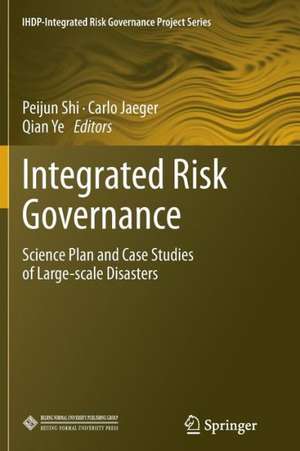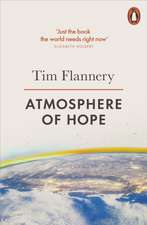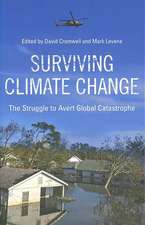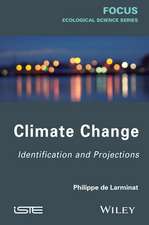Integrated Risk Governance: Science Plan and Case Studies of Large-scale Disasters: IHDP-Integrated Risk Governance Project Series
Editat de Peijun Shi, Carlo Jaeger, Qian Yeen Limba Engleză Paperback – 9 aug 2014
Prof. Peijun Shi works at Beijing Normal University, China; Prof. Carlo Jaeger works at Potsdam Institute for Climate Impact Research, Germany; Prof.Qian Ye works at Beijing Normal University, China.
| Toate formatele și edițiile | Preț | Express |
|---|---|---|
| Paperback (1) | 638.76 lei 6-8 săpt. | |
| Springer Berlin, Heidelberg – 9 aug 2014 | 638.76 lei 6-8 săpt. | |
| Hardback (1) | 648.42 lei 6-8 săpt. | |
| Springer Berlin, Heidelberg – 14 iul 2012 | 648.42 lei 6-8 săpt. |
Preț: 638.76 lei
Preț vechi: 751.47 lei
-15% Nou
Puncte Express: 958
Preț estimativ în valută:
122.23€ • 128.53$ • 100.99£
122.23€ • 128.53$ • 100.99£
Carte tipărită la comandă
Livrare economică 17 aprilie-01 mai
Preluare comenzi: 021 569.72.76
Specificații
ISBN-13: 9783642447891
ISBN-10: 3642447899
Pagini: 264
Ilustrații: XX, 244 p.
Dimensiuni: 155 x 235 x 14 mm
Greutate: 0.37 kg
Ediția:2013
Editura: Springer Berlin, Heidelberg
Colecția Springer
Seria IHDP-Integrated Risk Governance Project Series
Locul publicării:Berlin, Heidelberg, Germany
ISBN-10: 3642447899
Pagini: 264
Ilustrații: XX, 244 p.
Dimensiuni: 155 x 235 x 14 mm
Greutate: 0.37 kg
Ediția:2013
Editura: Springer Berlin, Heidelberg
Colecția Springer
Seria IHDP-Integrated Risk Governance Project Series
Locul publicării:Berlin, Heidelberg, Germany
Public țintă
ResearchCuprins
Part I: Integrated Risk Governance Project (IRG) Science Plan.- Executive Summary.- The Challenge.- Research Programme.- Outcomes.- Implementation Strategy.- Part II: Integrated Governance of Large Scale Disaster Risk.- Experiences and Lessons of Large-Scale Disaster Governance in China —Perspective to the Response of Wenchuan Earthquake Disaster May 12 2008.- Experiences and Lessons of Large-Scale Disaster Governance in China —Perspective to the Response of Freezing Rain and Snowstorm Disaster in South China Early 2008.- Avoiding the Avoidable. Towards A European Heat Waves Risk Governance.- Hurricane Katrina: A Teachable Moment.- China Wenchuan and Tangshan Earthquakes—Opportunity for Learning and Development.- Comparative Case Study of Entry Transition of Large-scale Disasters: 2008 South China Snow Storm and 2005 US Katrina.- Chinese Paradigm of Catastrophe Risk Governance.- The Community Model of Integrated Natural Disaster Risk Prevention in China.
Notă biografică
Professor Shi Peijun is the executive vice-president of Beijing Normal University. He is the vice chairman of the Expert Committee of the National Disaster Reduction Commission of China. He is also a member of OECD’s High Level Advisory Board on Financial Management of Large‐Scale Catastrophes. Prof. Shi is co-chairing Integrated Risk Governance (IRG) Project under International Human Dimensions Programme on Global Environmental Change (IHDP). He got his Ph. D degree of palaeogeography at Beijing Normal University and had a postdoctoral experience at College of Natural Resources, University of California at Berkeley, USA. Prof. Shi’s research focuses on natural disaster theories and risk governance. He has been the principal investigator of many national and ministerial research programs and has conducted numerous publications.
Carlo C. Jaeger is Professor for modeling social systems at Potsdam University in Germany, chair of the research domain "Transdisciplinary Concepts and Methods" (TCM) at the Potsdam Institute for Climate Impact Research, and chair of the Global Climate Forum (GCF). He is the co-chair of IHDP-IRG Project and has served on the boards of various scientific organizations. He holds degrees in economics (PhD, Frankfurt University), sociology (diploma, University of Berne), and human ecology (habilitation ETH Zurich) and has worked extensively on interactions between technological progress and environmental problems, in particular the role of information technologies for urban development. He has also considerable research experience in the field of stakeholder dialogues. His current research interest is focused on the role of financial markets in managing climate change and is the coordinator of the EUproject Global Systems Dynamics and Policies (www.gsdp.eu).
Dr. Qian Ye is Professor for climate change impacts at Beijing Normal University, deputy general secretary of the Chinese National Committee for IHDP and leading scientist of climate change at China Association for Science and Technology. He is the executive director of IHDP-IRG Project and member of the Scientific Committee. He got his bachelor degree of Meteorology and master degree of Dynamics at Beijing University, China, and Ph. D degree of Atmospheric Science at Oregon State University, USA. His current research interest is focused on the role of social and ecological dynamic system in dealing with climate change and its impacts.
Carlo C. Jaeger is Professor for modeling social systems at Potsdam University in Germany, chair of the research domain "Transdisciplinary Concepts and Methods" (TCM) at the Potsdam Institute for Climate Impact Research, and chair of the Global Climate Forum (GCF). He is the co-chair of IHDP-IRG Project and has served on the boards of various scientific organizations. He holds degrees in economics (PhD, Frankfurt University), sociology (diploma, University of Berne), and human ecology (habilitation ETH Zurich) and has worked extensively on interactions between technological progress and environmental problems, in particular the role of information technologies for urban development. He has also considerable research experience in the field of stakeholder dialogues. His current research interest is focused on the role of financial markets in managing climate change and is the coordinator of the EUproject Global Systems Dynamics and Policies (www.gsdp.eu).
Dr. Qian Ye is Professor for climate change impacts at Beijing Normal University, deputy general secretary of the Chinese National Committee for IHDP and leading scientist of climate change at China Association for Science and Technology. He is the executive director of IHDP-IRG Project and member of the Scientific Committee. He got his bachelor degree of Meteorology and master degree of Dynamics at Beijing University, China, and Ph. D degree of Atmospheric Science at Oregon State University, USA. His current research interest is focused on the role of social and ecological dynamic system in dealing with climate change and its impacts.
Textul de pe ultima copertă
"Integrated Risk Governance: Science Plan and Case Studies of Large-scale Disasters" is the first book in the IHDP-Integrated Risk Governance Project Series. It consists of two parts: Part I: Integrated Risk Governance Project Science Plan, which outlines the challenge, research programme, outcomes, and implementation strategy of the IRG Project; and Part II: Case Studies of Large-scale Disasters, which includes case analyses of experience, lessons learned and recommendations on various large-scale disasters around the world, such as the Tangshan and Wenchuan earthquakes and the great ice storm in China, European heat waves, and Hurricane Katrina in the USA. The community model of integrated natural disaster risk governance and paradigm of catastrophe risk governance in China are also presented.
Prof. Peijun Shi works at Beijing Normal University, China; Prof. Carlo Jaeger works at Potsdam Institute for Climate Impact Research, Germany; Prof.Qian Ye works at Beijing Normal University, China.
Prof. Peijun Shi works at Beijing Normal University, China; Prof. Carlo Jaeger works at Potsdam Institute for Climate Impact Research, Germany; Prof.Qian Ye works at Beijing Normal University, China.
Caracteristici
Outlines the mission, vision and research activities of the IHDP-IRG Project, a ten-year international cooperative research project. Introduces an integrated risk governance theoretical framework for dealing with large-scale disasters that exceed current human coping capacities based on global case analyses. Presents a comprehensive analysis of China’s risk governance paradigm learned from recent catastrophes. Includes supplementary material: sn.pub/extras











